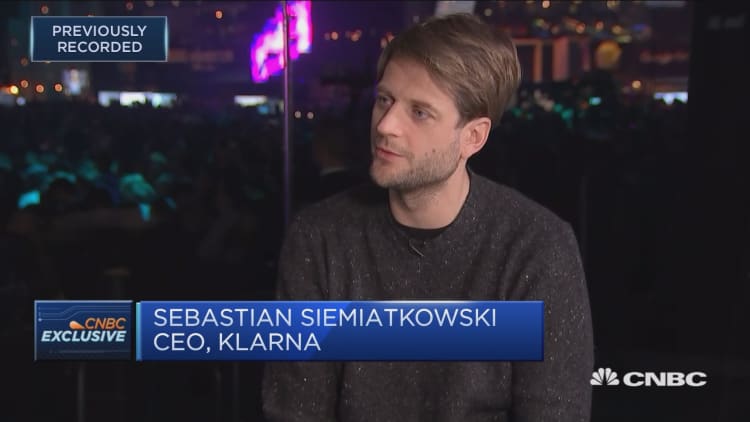
Banks will be faced with "massive disruption" in the next five years amid competition from financial technology challengers, the chief executive of Swedish bank Klarna told CNBC on Tuesday.
New European legislation that was introduced at the start of the year, called PSD2, requires banks to share their customer data with third-party providers to enable them to create new financial products.
Sebastian Siemiatkowski, Klarna's boss, said that this new regulatory framework and the rise of tech-driven banking players are a recipe for significant competitive pressure on traditional lenders.
"I'm one of those people who always say disruption is going to take 10 years or 15 years," Siemiatkowski told CNBC's Elizabeth Schulze at the Slush tech conference in Helsinki, Finland.
"I actually now really think that, with PSD2, there is going to be massive disruption to the retail banking space in the next five years. I just see all the prerequisites are there: the customers are willing now to switch, it's easy to switch, the services are better, with the new people coming into the stage."
A plethora of new fintech firms, including Britain's Revolut and Monzo and Germany's N26, have lured in millions of customers to their platforms. Known in the industry as digital challenger banks, these start-ups offer all of their services online and have no physical branches.
Klarna, which counts itself as a competitor to big banks, operates a little differently, providing payment solutions for consumers and merchants.
Siemiatkowski conceded that some financial giants — including the Netherlands' ING and U.S. investment bank Goldman Sachs — are doing "cool things" to keep up with the innovations displayed by their fintech rivals.
Under Chief Executive Ralph Hamers, ING has shifted its strategy to focus on digital innovation in retail banking, while Goldman Sachs has been making its own drive into retail banking with its digital-only banking platform Marcus.
Klarna's chief said that incumbent lenders have three options in the midst of competitive disruption from fintech firms. Some banks, he said, will "manage to transform themselves" as digitally-driven businesses; most will take the mergers and acquisitions (M&A) route, snapping up fintech competitors to get ahead; and, lastly, others will just "fail."
When asked whether a big bank might try to swallow his business through an acquisition, Siemiatkowski said that "some are going to try," but that the big opportunity for Klarna is to become a major financial business with a large market share.
"Banks in Europe and the U.S. are making too much profit on the consumers, and if we can play a part in disrupting this industry and actually drive margins down by giving consumers a better offer, I think we have accomplished something great, and that's what I want to do," he said.
Swedish retail giant H&M recently partnered with and took a stake in Klarna, in a bid to use the fintech firm's technology to integrate its digital shopping platform with its physical stores.


